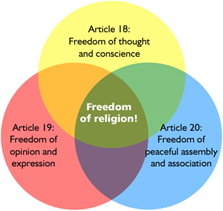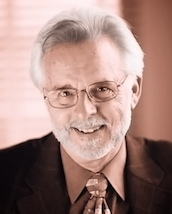 Freedom of worship is what you do within the four walls of the church, the synagogue, or the mosque. Freedom of religion is what you do outside the four walls of the church, the synagogue, or the mosque. It includes worship but also the right of believers to evangelize, change their religion, have schools and charitable institutions, and participate in the public square without having to hide their beliefs. Freedom of worship is what you do within the four walls of the church, the synagogue, or the mosque. Freedom of religion is what you do outside the four walls of the church, the synagogue, or the mosque. It includes worship but also the right of believers to evangelize, change their religion, have schools and charitable institutions, and participate in the public square without having to hide their beliefs. |
 Freedom of Religion on the Chopping Block
Freedom of Religion on the Chopping Block
by Wesley J. Smith
Intolerant secularism is on the march. In a blatant campaign of cultural imperialism, secularists and their leftist allies aim to shrivel the “free exercise” of religion to mere “freedom of worship.”
Freedom of religion and worship aren’t the same concepts. Indeed, free exercise was ably described by the late Supreme Court Justice Frank Murphy as having “a double aspect—freedom of thought and action.” In other words, we are not merely free to believe, but (generally speaking) to also act in the public square according to our faith precepts.
Freedom of worship is more limited. The Catholic Church can teach that the Eucharistic bread and wine transform into the literal body and blood of Christ, while Protestant denominations are equally at liberty to believe that Communion has a symbolic purpose. Mosques and Orthodox synagogues can require women to be segregated from men during services. Pentecostal Christians can speak in tongues. You get the idea.
Both free exercise and freedom of worship are important to religious liberty. We might even say, they’re mutually dependent on freely living a life of faith.
Unfortunately, outside of explicitly worshipping contexts, federal and state laws and legislation are increasingly bent on forcing religious believers to act consistently with the values of reigning secular morality when outside the home, church, synagogue, temple, or mosque. The message is clear: Those with traditional religious views of morality had better keep their beliefs behind closed doors—or suffer the consequences.
Gutting the First Amendment
What about the First Amendment, you ask? Alas, it isn’t what it used to be. In 1990, the Supreme Court significantly weakened the Constitution’s Free Exercise Clause in Employment Division v. Smith. The case involved two Native Americans ...
[ Full text ]
Comments powered by CComment